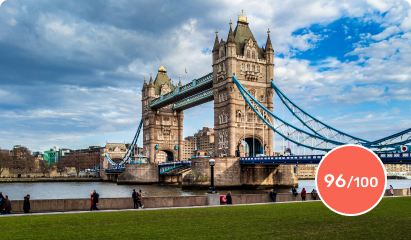CircleLoop’s Snapshot Analysis
5G Connectivity for Britain’s Businesses
Recent research found that the finance, automotive and retail industries are already the most reliant on 5G connectivity, and we can only expect this to increase as 5G adoption grows. The fast and reliable network capabilities are enabling better collaboration and communication, allowing businesses to future-proof with little disruption to operations and productivity. But as the UK rollout is still incomplete, your business's future could be stunted by a lack of local 5G where you need it.

Unleashing the Power of 5G
Revolutionizing Business Communications in the UK
By 2025, Barclay’s predicted that 5G could unlock up to £15.7 billion in business revenue for the UK. Could it be a coincidence then that BT’s UK PSTN switch-off will happen in the same year, driving businesses towards cloud-based options for business communications that will need 5G when WiFi isn’t available? We don’t think so. 5G is the future for businesses in many ways and communications are at the heart of what it can do.
It’s critical that leaders think about 5G in their business sooner rather than later. So, we’ve undertaken analysis to provide a snapshot of Britain’s current 5G connectivity, identifying the best and worst areas for service, to point business leaders in the right direction for their digital future.
The way we will be able to communicate and work anywhere will continue to take huge leaps with 5G, this is good news for businesses because the impending PSTN switch-off may push many to rely on this mobile network more than ever before as an alternative to super fast broadband connectivity. That is why we undertook this analysis of network data, to offer reassurance to those that have been reliant on the hardware in their office and to provide guidance to entrepreneurs looking to grow their operations on the new 5G capabilities.
Damian Hanson
CEO & Founder at CircleLoop
Top Ranked
Best Regions for 5G in Britain
British regions with the least 5G service and the lowest Business Connectivity Scores are Scotland (52/100), Wales (65/100) and the South West (69/100).

01 Greater London
London receives a Business Connectivity Score of 96 out of 100 for their 5G coverage from EE, Three, Vodafone and 02.

02 Yorkshire
Yorkshire is the second most 5G connected region in Britain, with a Business Connectivity Score of 86 out of 100 from the ‘Big Four’ networks.

03 East Midlands
In third place is the East Midlands, with a Business Connectivity Score of 85 out of 100 for 5G service from EE, Three, Vodafone and 02.
Hotspots
5G Hotspots in Britain
Of the 119 major towns and cities we analysed across Britain, only half (51%) are 5G ‘hotspots’ where all 4 UK networks provide some level of 5G coverage. We found that 6 of the 119 analysed still have no 5G connectivity at all. This includes Dorchester in the South East and several towns in Scotland.
Below follows a map that shows the Business Connectivity Score for each region and highlights notable 5G connectivity insights from major towns and cities in each. ‘Top connected towns’ have 5G service from all 4 UK Networks, ‘Least connected towns’ have 5G service from 1 UK Network or less.
Flexibility & lower latency
Why Care About 5G for my Business Communications?
5G is potentially 100 times faster than 4G. It is more flexible and has a lower latency which means you're less likely to experience those frustrating lagging issues while you work. On top of this, its impressive bandwidth will allow you to use more internet linked devices as part of your operations seamlessly. With customers increasingly expecting rapid responses from customer service teams and the PSTN switch-off driving huge change in the communications industry, planning for the future of 5G in your communication tools is wise.
Cloud-based communications, such as VoIP systems and virtual numbers, are already revolutionising how businesses make calls and 5G will only enhance that further. Getting ahead of the curve now will be a competitive advantage.
The Big Switch Off Impact
How Will 5G Help My Business After the PSTN Switch-off?
BT’s ‘Big Switch Off’ will impact many businesses still reliant on copper-wired connections. This includes PSTN which is used to power landlines, fax machines, payment terminals and more.
Though existing wireless networks will not be replaced by 5G, it will sit as an additional or alternative layer on top that will offer much faster and more reliable connections. As cloud-based phone systems and other internet tools are the best alternative to traditional systems after the switch off, 5G will be a huge benefit to businesses that choose to evolve in this way.
Britain is not fully 5G yet, but we’ve made a promising start that businesses can capitalise on. The implications of 5G for business are exciting, it’s a huge ‘unlock’ for leaders looking to digitally transform to be more agile, upgrade their tech stack or diversify customer offerings. Keeping an eye on its availability for your business just makes sense.
Damian Hanson
CEO & Founder at CircleLoop
Research approach
Methodology
The Business Connectivity Score is based on the latest 5G availability data sourced from the UK’s 4 major phone networks; EE, Three, Vodafone and 02. The score is calculated using this network data from 119 major towns and cities across Britain (England, Scotland and Wales).
If all 4 networks provide 5G in a town or city the score is 100, if only 2 of the 4 networks provide 5G the score is 50. This score is then averaged across the regions to account for size of the region and number of towns included in the analysis.
Are you ready?
We’re here to help you stay connected
At CircleLoop we’re here to help you stay connected. Our cloud-based phone system offers seamless integrations with a number of other apps and platforms too and provides virtual numbers when you’re looking to call from a particular location while you’re on the go.
